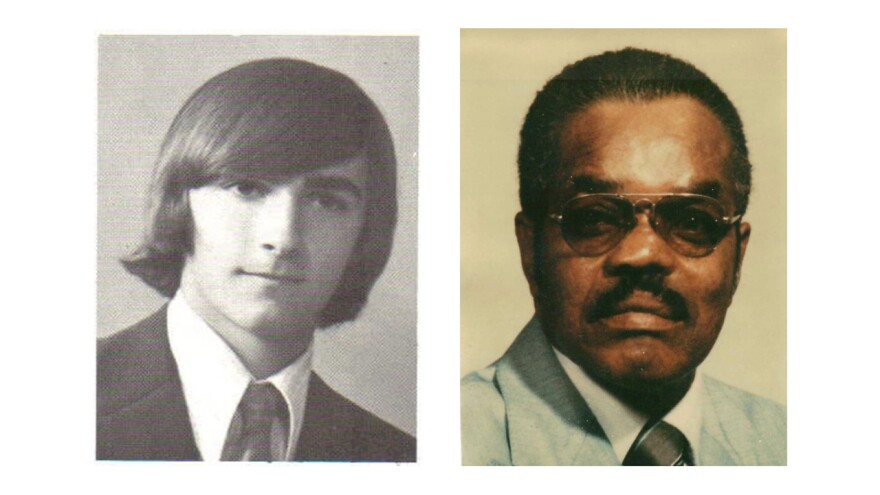BETHLEHEM, Pa. — Behind every missing person or unsolved murder case is a family that continues to look for answers and hope for justice.
And sometimes, law enforcement agencies investigating those cases need a clue or a thread to pull on.
That’s where the public can help.
Active and cold cases, missing persons and more are in the spotlight thanks to a crime-fighting initiative recently unveiled by Pennsylvania State Police.
"We’re really trying to get the word out there and work in collaboration with the public and solve some of these crimes."Trooper Nathan Branosky, PSP Troop M public information officer
Social media platforms, a toll-free number and online tip form all are part of what police are calling “PSP Tips” — a means for the community to provide information that might help solve a case and put criminals behind bars.
“There are three different ways that the public can assist with providing tips to solve cases,” said Trooper Nathan Branosky, public information officer for Bethlehem's Troop M.
“Facebook provides missing-persons cold cases, common crimes that we're seeing, and there's photos of both victims and suspects that are out there, including thefts and common criminal mischief that we are having trouble solving.”
Branosky said those who have tips to share can do so anonymously, and monetary rewards also are offered, depending on the case and the outcome.
“We’re really trying to get the word out there and work in collaboration with the public and solve some of these crimes,” Branosky said.
Tips could help cold cases heat up
There are 16 state police troops, Branosky said, and each one — including Troop M — has a cold case investigator.
“These cold cases, although they're considered cold cases, are constantly being investigated," Branosky said. "We're constantly following up on leads that we get throughout the years, but they are cold cases that we haven’t solved yet.”
It means any information, no matter how small, might give police the breakthrough needed.
“That small little detail could assist in eventually finding a conclusion to the case” and bringing closure and justice for the victims' families, Branosky said.
"So there's a number of cases out there, cold cases including thefts and common criminal mischief, that we are having trouble solving.”Trooper Nathan Branosky, public information officer for Bethlehem's Troop M
Some of those cases go back decades.
“We have cold cases such as the Rose Hnath case, where she was found deceased in January 1989 in her house in North Whitehall, or Robert Freeman, who was found deceased in a cornfield on Uhler Road in Forks Township [in 1992].
“We have the case of David Allen Gross, who was found in the trunk of his vehicle in Upper Mount Bethel Township in Northampton County [in 1977, just eight days after his 21st birthday.]
"So there's a number of cases out there, cold cases including thefts and common criminal mischief, that we are having trouble solving.”

Leveraging contemporary methods
Over 35 years, the death of Rose Josephine Hnath has moved from a standard police investigation to one involving science and investigative methods that weren’t available in 1989.
That includes the use of genetic genealogy, which drew national attention in 2018 with the arrest of Joseph DeAngelo, a former cop who was identified as the "Golden State Killer" responsible for 13 murders and more than 50 rapes in California from 1974 to 1986.
DNA left at the scene of Hnath’s murder allowed a profile to be established, and investigators then partnered with Innovative Forensic Investigations, a Virginia-based company that analyzed the profile in various databases in search of a match.
The man at the helm of the Hnath investigation has been Thomas McAndrew, a retired Pennsylvania state trooper and major case investigator for the Lehigh County District Attorney’s Office.
“What we would have done is we would have gotten the extract that existed from crime scene samples,” said McAndrew, who lives in the Lehigh Valley and was familiar with the Hnath case.
“We do the genealogy work, we do the investigation to try and determine who that DNA actually belongs to, to try to guide the state police into who their suspect could possibly be,” he said.
Needle in a haystack
While it’s an innovative way to advance the most difficult cases, the research involved can be incredibly time consuming and comparable to looking for a needle in a haystack.
“We’re doing a case right now where we have the family tree populated and we have 20,000 people in that family tree,” McAndrew said.
“When you branch out who carries DNA down these genetic lines, you have to sometimes have law enforcement go out and actually get us reference samples from people in the tree, so that we know which side of the tree we're actually doing the work on.”
McAndrew said investigators use only databases that cooperate with law enforcement, including GEDMatch and Family Tree DNA. Both are online databases where people can upload their DNA results in the hopes of finding more relatives than popular consumer sites such as 23andMe and Ancestry.com.
Users consent to their genetic data being shared with police, which can let investigators find their suspects.
“What they do is they make sure everybody that allows us to use their DNA and that database is a consented sample,” McAndrew said.
“That means the person said, ‘Yeah, I want to trace my ancestry, but I don't care if the police use my DNA to find somebody that's a third cousin or something.’”
Bolstering hopes of cracking a cold case, he said about 90% of people in the United States will consent to law enforcement using their DNA sample.
“As we're doing our family tree research, and we send law enforcement out and say, ‘Hey, listen, we're not sure which side of the tree this is coming from, we need to get a DNA sample from somebody in the tree,’" McAndrew said.
"Usually, when law enforcement goes out and makes contact with somebody, most people actually will give it.”
Painstaking work
“When you do DNA analysis, a lot of the DNA is the same,” McAndrew said. “We have to sort it out to see, so sometimes it's really painstaking.”
The long, drawn-out process means the case gets handed back and forth from McAndrew’s team to the state police investigator currently handling the case.
Hnath’s DNA is back in the hands of law enforcement, he said, using the word “puzzle” as “the best analogy of the whole process.”
Funding also is needed to offset the cost of the scientific and investigative techniques being used to solve cold case homicides and violent crimes.
"The laboratory analysis is the most expensive part of it,” McAndrew said. He said that with a net laboratory analysis, database uploads and the work his company does, “You're probably looking at between $5,000 and $10,000.”
He credits former Lehigh County District Attorney Jim Martin for the Hnath investigation being where it is now.
“The whole reason that the Hnath case got moved along with the genealogy was, I went to Jim Martin and Jim Martin paid for it,” McAndrew said.
It’s also not the only local case on which Innovative Forensic Investigations is working.
The team also is using genetic genealogy to help determine the identity of skeletal remains discovered in Canal Park in Allentown in April 1991.
The unidentified case is the only one remaining in Lehigh County.
“We’re actually still working on that," McAndrew said. "We work on that on a regular basis.
"We're at the point where we actually have law enforcement and states outside of Pennsylvania that are actually helping us on that to get DNA samples.”
‘Police can’t do it on their own’
“We want to thank the public for their assistance so far with PSP Tips," Branosky said. "But moving forward, we understand how important it is to have the public assistance in these investigations.
"Police can't do it on their own. We do need the public's assistance in solving crimes.”
PSP Tips is now the impetus to show “crime can’t be tolerated,” and the public working in conjunction with law enforcement will let police move a case forward — hopefully to conclusion.
"We understand how important it is to have the public assistance in these investigations. Police can't do it on their own. We do need the public's assistance in solving crimes."Trooper Nathan Branosky, Troop M public information officer
Anyone with information on any featured cases can contact state police toll free at 1-800-4PA-TIPS (8477) or online at https://www.p3tips.com, where tipsters also can upload videos and photos for investigators to review.
“The social media platforms, the toll-free number, and the online tip form are all easy ways to send us information that may solve a case or get a dangerous individual off the streets,” said Lieutenant Colonel George Bivens, Deputy Commissioner of Operations.
Bivens called the collaborative process “vital” to solving cases and bringing each case to conclusion.
"Every cold case victim is someone's mother, father, daughter, son or other," said a post shared on the Innovative Forensic Investigations Facebook page.
"They deserve to get their names back, and their families deserve answers."
All cases in which PSP requests public assistance can be viewed at the following social media sites:
Facebook: https://www.facebook.com/PSPTips
Twitter: https://twitter.com/PSP_TIPS
Each site provides a toll-free phone number, 1-800-4PA-TIPS (1-800-472-8477), and a link to an online tip submission form.



